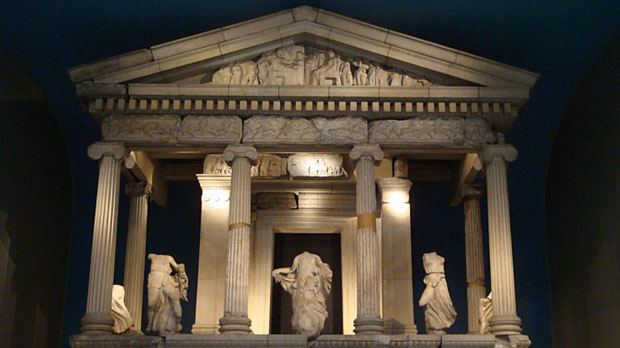The best answer to this question so far is perhaps the one given by Melina Mercouri during her famous speech to the Oxford Union in 1986:
“You must understand what the Parthenon Marbles mean to us. They are our pride. They are our sacrifices. They are our noblest symbol of excellence. They are a tribute to the democratic philosophy. They are our aspirations and our name. They are the essence of Greekness.”
Before I tell you why I think we feel so strongly about these Marbles, allow me first to digress slightly. Two years ago, British Prime Minister David Cameron addressed Parliament with a remark that I simply think is the epitome of arrogance. It was about the Parthenon Marbles in response to the Greek demands for their repatriation. The infamous remark was a play on words: “Britain has no intention to lose its marbles.”
Obviously, the Prime Minister attempted to appear witty by suggesting that to give the Marbles back would mean to lose one’s mind (or losing one’s marbles according to the British saying). I think however that there was no wit in that remark whatsoever. On the contrary, given the fervour of the Greek demand and knowing the things I know which he obviously does not, such insensitivity and conceit in his response render his ‘wit’ quite disgusting to my sensitive Greek ears.
But what is it about these lifeless slabs of marble that is so important? What made Thomas Hardy refer to them as “captives in exile”? Why did Melina Mercouri once declare that should they return after her death, then that day she will be reborn? What makes celebrated British actor Stephen Fry such a passionate supporter of the cause and why do his eyes twinkle when he speaks about their return to “the blue light of Greece”? What do they all see in these ancient pieces of stone that Mr Cameron still cannot grasp?
A great measure of insight can perhaps be gained by reading a short passage from my recently published novel ‘The Necklace of Goddess Athena’. One of its leading characters is Efimios; an unsung hero of Athens who has saved the city many times by undertaking time-travelling missions (as instructed by Goddess Athena) in order to protect the city from its enemies. One of his missions involved his intervention during the Greek War of Independence against Turkish rule in the 1820’s. Although the passage that follows is a work of fiction in the sense that it suggests the involvement of Efimios, the event itself is absolutely true. It happened on the top of the Acropolis hill and at the time, Elgin had already been there to loot the Parthenon temple to a devastating effect.
“At the time, the Turkish army had taken over the Acropolis and they were under siege by the Greeks led by Odysseus Androutsos. The enemy had run out of ammunition and they started to tear down the pillars of the Parthenon temple gouging out the lead inside them in order to melt it and cast bullets. The Greeks found out and the terrible news spread like wildfire among the troops. One of the few things that the average Greek has always been very sensitive about is the protection of the Parthenon from further harm. Led by this sensitivity, the Greeks delivered to the Turks a load of lead with the famous phrase: ‘Here are your bullets; don’t touch the pillars’. Efimios was there, having carried part of the load himself after raising the alarm among the men. As Athena had guessed, the Greeks had responded in the only way possible. They had virtually redeemed the pillars from the enemy with their blood seeing that the delivered lead was meant for their own chests. This blind valor that borders on madness is the very reason why the Gods never forsake this nation. Its people have a favorite saying: ‘God loves the Greeks’. Often, just when all hope seems lost, a handful of Greeks will come together and perform a small miracle. And in such times, although the rest of the world may watch in incredulity, the average Greek will deem it entirely normal because of the specific conviction that is etched inside his soul.”
To me, Efimios is the embodiment of the Greek spirit throughout the ages. He has sprung forth from my mind as a result of my frustration while trying to explain to my many friends abroad what it means to be Greek. He is the very DNA of Plato and Socrates that we Greeks still feel, grinding in our bones in protest as we swallow down callous and ignorant comebacks from people who fail to see our legitimate reasons for claiming our stolen treasures so persistently. What our cackling opponents in this noble cause fail to understand is that our notorious stoicism in the face of hardship through the ages renders us stronger in the long run and therefore unlikely to ever give up.
One day, Melina Mercouri will get her wish and she will be reborn when that glorious day comes; when the looted relics like the ones we once protected with our lives finally grace our shores again. There are five Caryatids in the Acropolis museum. They are five eternal maidens with long hair braided down their backs. Being made of stone, they seem tireless as they stand on their feet still, waiting patiently for the return of their sixth sister from London. There isn’t one among us that doesn’t regard them as living and breathing things while we watch them wait. Through the ages that follow, anything is possible. Perhaps 10 Downing Street will have a true philhellene inhabitant some day; someone who will see clearly our logic behind our unwavering persistence. As for Mr Cameron, perhaps he should consider saving his lighthearted jokes for the local pub. After all, this was the venue where he once performed his most renowned joke to date. Neither ignorance nor arrogance is an admirable quality for a man who has been elected to lead so many lives by example. The world doesn’t need more wit or cleverness. After all, it is the scourge of worldwide ‘cleverness’ from politicians, banks and colossal institutions that has brought the world to the fine mess that it is now in. What the world needs right now is dreamers, thinkers and a good measure of common decency.
By Effrosyni Moschoudi
Reposted with permission from EFFROSYNI’S BLOG – The public diary of a Greek dreamer



